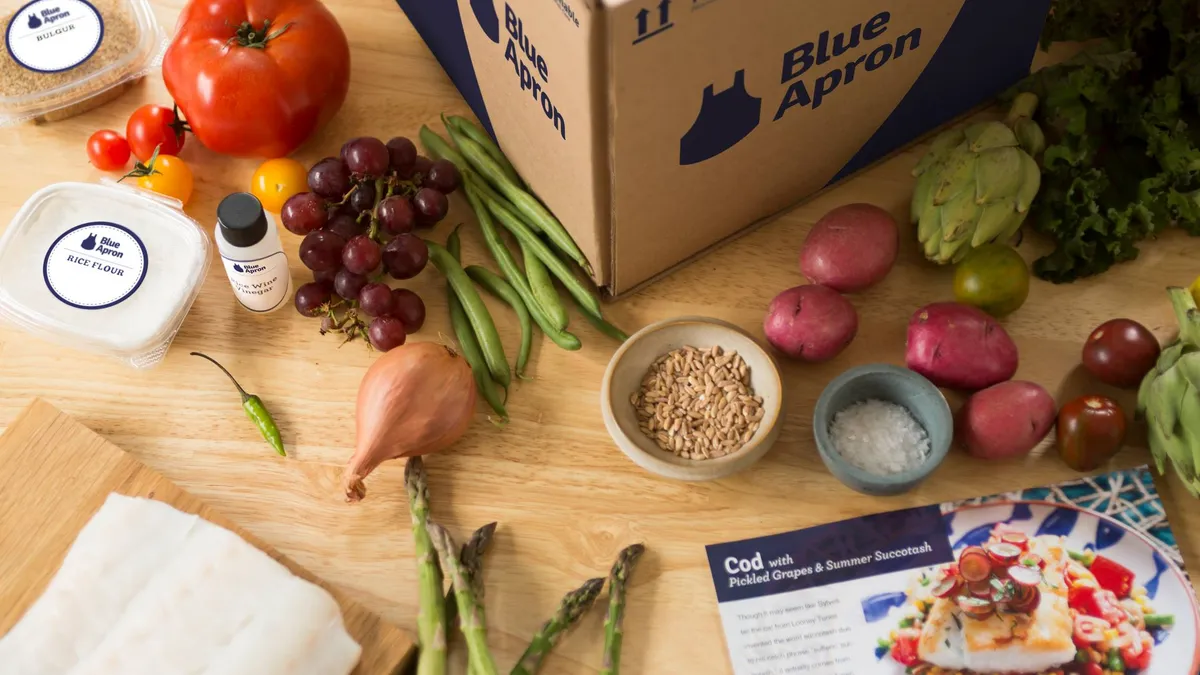Dive Brief:
- Gabelli & Co. analyst Matthew Trusz labeled Walmart a "logical buyer" for Blue Apron, stating the deal would add another valuable e-commerce company to the retailer's stable, according to CNBC. Trusz initiated coverage of Blue Apron Friday, saying that he now recommends it to investors following the correction of “operational issues” that caused its share price to drop more than 50% since its initial public offering in June.
- Speculation that Walmart might buy Blue Apron helped stock raise shares of the troubled meal kit delivery company by almost 7% on Friday, CNBC reported.
- Trusz wrote that Blue Apron can reach as many as 8.25 million households currently — and that number should grow as online grocery shopping continues to expand. If Blue Apron were acquired, it would most likely sell for approximately $6 a share, Trusz wrote.
Dive Insight:
How realistic is this deal? Walmart only has a limited number of meal kits available now, and could use the food manufacturing facilities, but it certainly doesn't need Blue Apron to quickly ramp up a meal kit line. The mega retailer may be more interested in the technology and data-mining abilities Blue Apron possesses. But would those capabilities be worth the large meal kit company's price tag?
Then again, buying an e-commerce company with a premium value proposition would be in keeping with Walmart's acquisition playbook.
"Like its $310 million purchase of Bonobos, buying Blue Apron would repeat Walmart's playbook of acquiring a branded e-commerce startup with a more-premium product to its core offerings," Trusz is quoted as writing to investors. "Further, Walmart could put Blue Apron's meal kits into its physical stores, which we believe would meaningfully enhance Blue Apron's profitability (more scale, less packaging)."
The infusion of cash from the far stronger company could enable Blue Apron to overcome its difficulties once and for all, and be in a better position to grow. The company's problems trace back to a fulfillment center in Linden, NJ, that cost more than expected, was slow to ramp up and was having an adverse impact on profits. In November it was reported that the facility was months away from becoming fully operational. Meanwhile costs were rising, subscribers were leaving and revenue growth had greatly diminished. As far back as June, when it filed for its IPO, Blue Apron warned that it had “a history of losses, and we may be unable to achieve or sustain profitability.”
But now Trusz reported, Blue Apron is “turning the corner on well-publicized operational issues.” As a result it could become an attractive acquisition target.
The meal kit market represents an $8 billion opportunity or more, but was only about one-tenth that size a year ago, Trusz said. As a result, more grocery companies will become interested in services like Blue Apron. “Traditional competitors are facing rapid digital and discounter disruption, and are indicating interest in meal kits,” he wrote.
So far the meal kit business has been difficult, and not all companies entering that space have survived. Customer loyalty is especially fleeting. Kroger and Publix have successfully started their own meal kit brands, and Plated was bought by Albertsons last year. HelloFresh has been listed on the Frankfurt stock exchange since last year, and said it would break even in the U.S. this year.








